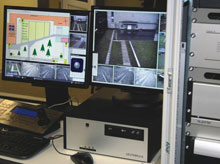In 2010 practically the entire Geutebruck video security product range was awarded official Russian ‘OIT' certification confirming its suitability for use in nuclear power stations and other nuclear facilities. This testing and certification of physical security and safety products for use in the Russian nuclear industry is carried out by the Interdisciplinary Special Training Centre (ISTC) in Obninsk. Part of Rosatom, the national atomic energy corporation, this institution provides advanced security training for managers and specialist staff working in the atomic field, and acts as the standards and certification authority for physical safety and security equipment used there.
Set up in 1993 with international assistance, the ISTC is a world leader in the training and continuing education of specialists in the field of physical security for atomic sites. Its principal Yury Barabanov, reports, "Co-operation with American partners is very constructive. With their aid we have been able to build up a modern training centre with excellent teaching and physical resources, all necessary teaching and materials as well as an up-to-date set of standards documentation. We have a large range of technical teaching materials and our own training sites where dozens of the latest monitoring systems operate under realistic conditions."
Assessment and testingRecent upgrades have seen the laboratories and proving grounds expanded and equipped with the latest equipment for electromagnetic, functional, climatic and mechanical testing. Here new products and systems are checked under conditions which are as close as possible to those found on nuclear sites, and this includes examining responses to power failures and other technical problems. "This," claims Evgeny Taranov, head of the standards and certification department at ISTC, "is a special focus of ours and what sets our approach apart from other certification systems."
The centre's clients are leading Russian and foreign security equipment manufacturers who usually submit small numbers of devices for certification. So it was a significant event for the ISTC testers when GVS ZAO submitted practically the whole Geutebruck range of video security products for certification.
 |
| A Geutebruck video security system is put through its paces in the ISTC lab |
The multifaceted process involves analyzing the documentation and the verification of production checks as well as physical testing. This meant GVS ZAO needed to provide Russian language documentation for all individual components and for complete CCTV systems, comprehensive data on the operation of equipment at dozens of sites, as well as the documentation required by other certification authorities. All this material was used by ISTC specialists to compile the basis for certification and to assess the most important reliability parameters which then need to be confirmed during the certification process. The tests then covered the full functionality of the equipment; its electromagnetic tolerance and its response to external influences as well as its overall performance in realistic conditions.
For certification the ISTC specialists also needed to satisfy themselves about the manufacturing quality control procedures. As Konstantin Arbuzov, GVS ZAO's marketing manager for Russia and CIS countries explained, "Here Geutebruck benefits from the fact that its video systems are tested at each production stage, then assembled and integrated with other systems before leaving the factory. Whole installations are set up and tested in operation. Usually the official hand-over to the customer takes place in Windhagen too, with the final technical adjustments being made at that time. In effect what is delivered to site is a fully tested, fully functional system which already meets all the customer's requirements." - He was therefore gratified but not surprised that the ISTC team concluded that the Geutebruck production checks do indeed guarantee high quality and readiness for on-site operation.
Why certification?
As Arbuzov reflects, "Although the certification process is particularly strict in all regards - from document preparation to the technical testing on the proving ground - you have to admit that it is justified and necessary. After all the security of atomic sites depends on it. And of course we were delighted that Geutebruck equipment was successful in every respect."
With high profile customers including Gasprom, government departments and the Russian Federation Central Bank, GVS ZAO is well-established in the Russian security market. Not only are Geutebruck system solutions already standard at Rosatom sites associated with the international programmes for the EU and USA atomic security, but some of their equipment is already installed by a number of Russian systems integrators in companies in the atomic energy industry and in Rosatom scientific research sites and nuclear weapons complexes. However there is little doubt that the certification of Geutebruck's product range will enable the company to significantly strengthen its position.
"Certification gives us an important competitive advantage," reports Arbuzov. "It opens up new sales opportunities and helps to promote new developments. For customers who don't necessarily operate in the atomic field, this ‘OIT' certificate represents the ultimate confirmation of security and functional capabilities and that gives us the edge over other video security systems."












